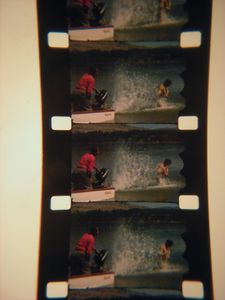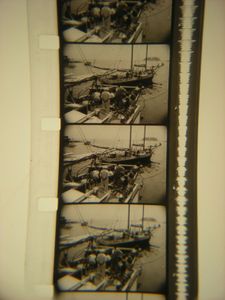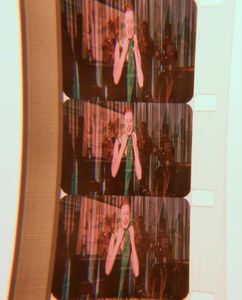| Welcome to Sprocket School! This project is maintained by volunteer editors. Learn more about how this works. |
Aspect ratios: Difference between revisions
No edit summary |
No edit summary |
||
| Line 1: | Line 1: | ||
[[File:35mmaspectratios.JPG|right|thumb|300px]] | [[File:35mmaspectratios.JPG|right|thumb|300px]] | ||
The '''aspect ratio''' is the ratio of the projected image's width:height when projected on the screen. In practice, the term is also used to refer to the image's width:height ratio as printed on the film. | |||
* | |||
* the fact that aspect ratios are rarely exact - in reality, aperture plates are cut approximately, etc. | |||
==Small Gauges: 8mm, Super 8, etc.== | |||
==16mm== | |||
The [[16mm]] frame has a native full-frame aspect ratio of nearly (though not exactly) 1.33:1. This is the aspect ratio of the vast majority of 16mm prints. | |||
* | |||
Other 16mm aspect ratios exist, however. Some prints are hard-matted to widescreen aspect ratios like 1.85 and 1.66 (this is seen with some frequency on 16mm reductions of widescreen feature films originally released on 35mm). | |||
Anamorphic 16mm prints also exist. These have an aspect ratio of 2.66:1. | |||
* Pan/scan, cropping, and other TV print issues | |||
<gallery widths=300px heights=300px> | |||
16mm-doubleperf-silent.jpg|''Conventional full frame 16mm print without soundtrack'' | |||
File:16mm-mono-single.jpg|''Conventional full frame 16mm print with soundtrack'' | |||
File:16mm-scope2.jpg|''Anamorphic 16mm print'' | |||
</gallery> | |||
==35mm== | |||
== | <gallery widths=300px heights=300px perrow=2> | ||
File:Aspectratios-frame.png|Aspect ratios as they appear in the film frame.<br>'''Red''' 1.33, '''Blue''' 1.37, '''Yellow''' 1.66, ''''Green''' 1.85 | |||
File:Aspectratios-screen.png|Aspect ratios as they appear on a full-width [[screen]]. | |||
</gallery> | |||
{| class="wikitable sortable" | {| class="wikitable sortable" | ||
|- | |- | ||
! Gauge !! Aspect Ratio !! Other names !! Year of Introduction !! Notes | ! Gauge !! Aspect Ratio !! Other names !! Year of Introduction !! Image !! Notes | ||
|- | |- | ||
| [[35mm]] || 1.33:1 || Silent / Full Frame || 1907 || | | [[35mm]] || 1.33:1 || Silent / Full Frame || 1907 || || | ||
|- | |- | ||
| [[35mm]] || 1.19:1 || Movietone || 1926 || | | [[35mm]] || 1.19:1 || Movietone || 1926 || || | ||
|- | |- | ||
| [[35mm]] || 1.37:1 || Academy ratio || 1932 || Sometimes incorrectly called 1.33 | | [[35mm]] || 1.37:1 || Academy ratio || 1932 || || Sometimes incorrectly called 1.33 | ||
|- | |- | ||
| [[35mm]] || 1.66:1 || || 1953 || Warning: widescreen formats may be soft-matted | | [[35mm]] || 1.66:1 || || 1953 || || Warning: widescreen formats may be soft-matted | ||
|- | |- | ||
| [[35mm]] || 1.78:1 || || ? || Used for films that originated on video. | | [[35mm]] || 1.78:1 || || ? || || Used for films that originated on video. | ||
|- | |- | ||
| [[35mm]] || 1.85:1 || Flat || 1953 || Warning: widescreen formats may be soft-matted | | [[35mm]] || 1.85:1 || Flat || 1953 || || Warning: widescreen formats may be soft-matted | ||
|- | |- | ||
| [[35mm]] || 2.39:1 || CinemaScope / Anamorphic || 1953 || CinemaScope aspect ratios vary. | | [[35mm]] || 2.39:1 || CinemaScope / Anamorphic || 1953 || || CinemaScope aspect ratios vary. | ||
|- | |- | ||
|} | |} | ||
* Determining correct aspect ratios for widescreen, etc. | |||
** Eyeballing and measuring | |||
** Educated guesses based on year, studio, country, etc | |||
** Caveat: there is no "correct," historically - so contentious! | |||
==70mm== | |||
==See Also== | |||
* [[Aperture plate]] | |||
* [[Lens]] | |||
* [[Masking]] | |||
Revision as of 15:58, 12 August 2013

The aspect ratio is the ratio of the projected image's width:height when projected on the screen. In practice, the term is also used to refer to the image's width:height ratio as printed on the film.
- the fact that aspect ratios are rarely exact - in reality, aperture plates are cut approximately, etc.
Small Gauges: 8mm, Super 8, etc.
16mm
The 16mm frame has a native full-frame aspect ratio of nearly (though not exactly) 1.33:1. This is the aspect ratio of the vast majority of 16mm prints.
Other 16mm aspect ratios exist, however. Some prints are hard-matted to widescreen aspect ratios like 1.85 and 1.66 (this is seen with some frequency on 16mm reductions of widescreen feature films originally released on 35mm).
Anamorphic 16mm prints also exist. These have an aspect ratio of 2.66:1.
- Pan/scan, cropping, and other TV print issues
-
Conventional full frame 16mm print without soundtrack
-
Conventional full frame 16mm print with soundtrack
-
Anamorphic 16mm print
35mm
-
Aspect ratios as they appear in the film frame.
Red 1.33, Blue 1.37, Yellow 1.66, 'Green 1.85 -
Aspect ratios as they appear on a full-width screen.
| Gauge | Aspect Ratio | Other names | Year of Introduction | Image | Notes |
|---|---|---|---|---|---|
| 35mm | 1.33:1 | Silent / Full Frame | 1907 | ||
| 35mm | 1.19:1 | Movietone | 1926 | ||
| 35mm | 1.37:1 | Academy ratio | 1932 | Sometimes incorrectly called 1.33 | |
| 35mm | 1.66:1 | 1953 | Warning: widescreen formats may be soft-matted | ||
| 35mm | 1.78:1 | ? | Used for films that originated on video. | ||
| 35mm | 1.85:1 | Flat | 1953 | Warning: widescreen formats may be soft-matted | |
| 35mm | 2.39:1 | CinemaScope / Anamorphic | 1953 | CinemaScope aspect ratios vary. |
- Determining correct aspect ratios for widescreen, etc.
- Eyeballing and measuring
- Educated guesses based on year, studio, country, etc
- Caveat: there is no "correct," historically - so contentious!
70mm
See Also




